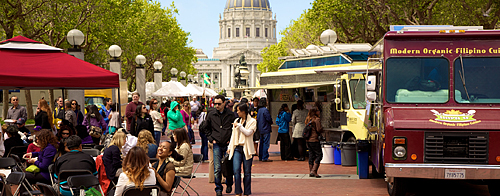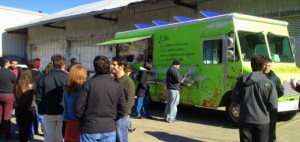The post Street Food: A Fresh Start appeared first on Paul Terry & Associates.
]]>
Off the Grid
Last week the San Francisco Board of Supervisors unanimously passed Supervisor Scott Weiner’s food truck reform legislation. After two years of negotiation Weiner was able to achieve a compromise on which both restaurants and food trucks could agree—trucks will now be able to operate on college and hospital campuses and park closer to middle and high schools, but they will have to comply with a 75-foot buffer around brick-and-mortar restaurants.
In his statements last week, Matt Cohen, founder of Off the Grid said, “Every single piece of this legislation was a compromise from both sides. We’re glad about having the process be cleaner, but it’s a wait-and-see approach about how it plays out in practice. I think all stakeholders have that approach at this point.”
Between this new San Francisco food truck ordinance and the California Homemade Food Act, there are a lot of legislative changes affecting local food entrepreneurs right now. The first San Francisco Cottage Food permit was just issued in April to a Dogpatch resident, just a few blocks from my office. It is a different landscape for food entrepreneurs than just a few years ago. Some of my curent clients and students will be impacted by these new laws so I will continue to follow the issues closely.
The post Street Food: A Fresh Start appeared first on Paul Terry & Associates.
]]>The post San Francisco Food Fights appeared first on Paul Terry & Associates.
]]>The current food truck regulations haven’t been working well for either side. If Supervisor Weiner’s new legislation is passed, it would prohibit food trucks from doing business within 50 feet of a restaurant but would also allow food trucks to operate in parts of the city where they’ve been previously banned.
At the PDMA meeting, Supervisor Weiner explained to us that that current rules have made whole areas of the city, including a large portion of the Mission, off-limits to food trucks. He wants to encourage more trucks to congregate in areas like SOMA and the Financial District. The bill would legalize food trucks on all hospital and college campuses and allow trucks to park closer to schools, decreasing the buffer from 1,500 feet down to 500 feet for middle schools and between 750 and 1,000 feet for high schools.
PTA has worked with and taught restaurant owners and food truck owners and we understand the challenges on both sides—the costs, the competition, finding the right location, scalability and market demand. Running a small food business—whether it is attached to one spot or mobile—is very hard work and it is important that our local legislators are listening to business owners’ concerns and supporting small business issues. I appreciate Supervisor Weiner’s efforts to move the conversation forward.
The post San Francisco Food Fights appeared first on Paul Terry & Associates.
]]>The post Home-based Foodies in the Game appeared first on Paul Terry & Associates.
]]>
In January, 2013 the California Homemade Food Act was signed into law, making it legal for people to sell “low-risk foods” produced in their home kitchens. A food entrepreneur who wants to qualify as a Cottage Food Operation must meet a few criteria:
- Produce foods on the approved list,
- Have gross sales this year of $35,000 or less (by 2015 this will go up to $50,000),
- Complete a food processor training course, and
- Have product labels that meet state and federal requirements.
There are more details of course. Note the two categories of cottage food operation:
- Class A operations can only sell directly to the consumer (which can include at community events, farmers’ markets and through CSA subscriptions) and can register with a self-certification compliance checklist.
- Class B operations must be inspected to receive their permit but can then sell to restaurants, retail food stores and food trucks.
Before this legislation became law, you needed to use a commercial kitchen or food processing facility (such as Eclectic Cookery) to legally sell your food product (or join a kitchen incubator, like La Cocina). For many entrepreneurs who are just starting out, testing their food business ideas by renting a commercial facility is cost prohibitive. Now there is a way to start small at home legally.
The success of the now-closed Underground Market in San Francisco is a clear sign of how many people will be able to benefit from this new law and also how many people want artisanal food. With a pick-up in the economy, there should be more customers for a good product… if it is sold effectively and meets the considerations of the target market. It is a great time for micro businesses and home-based entrepreneurs to really test their products, their ability to do the work and their commitment to be small business owners. There’s a lot of new energy out there to support small food businesses and new policies like this Homemade Food Act to stimulate the growth of the industry.
To learn more about the California Homemade Food Act and how to obtain a cottage food operation permit, go to the San Francisco Department of Public Health and the California Department of Public Health websites.
The post Home-based Foodies in the Game appeared first on Paul Terry & Associates.
]]>